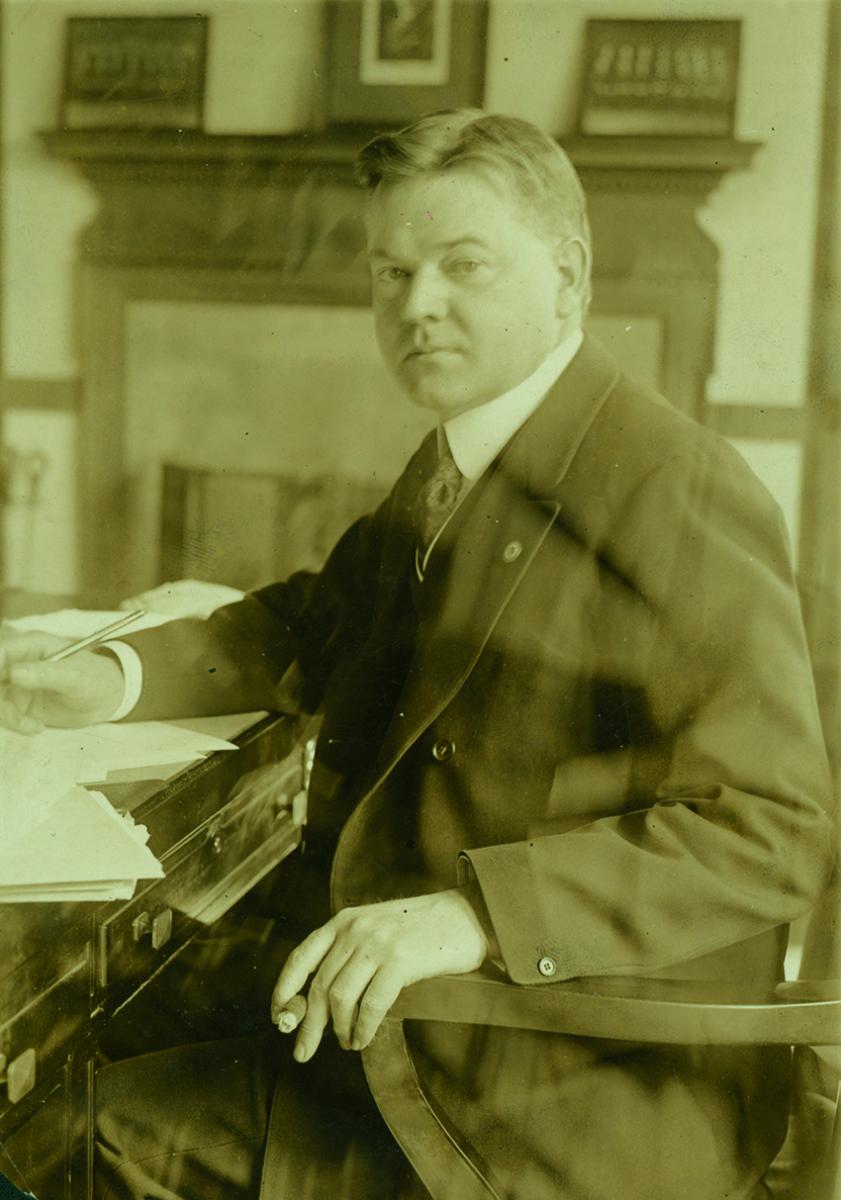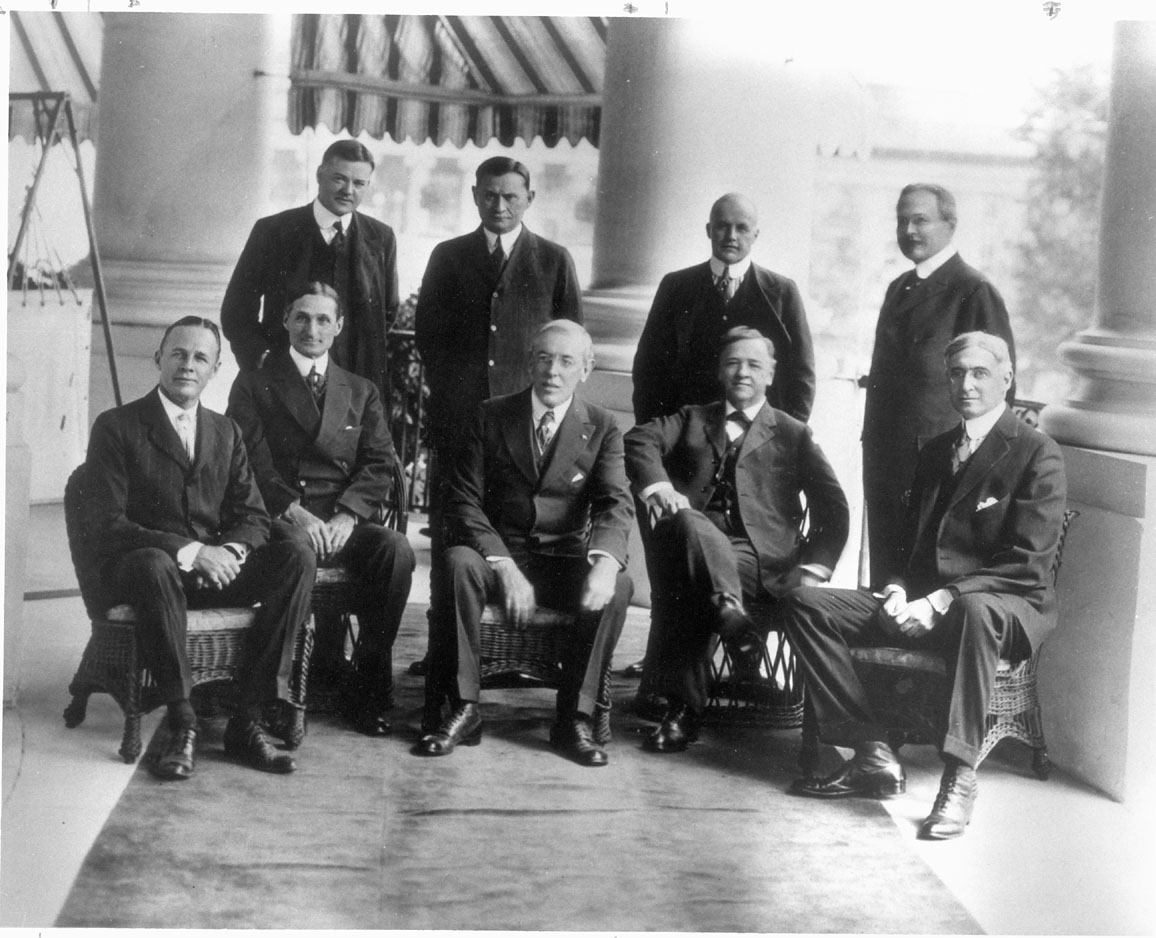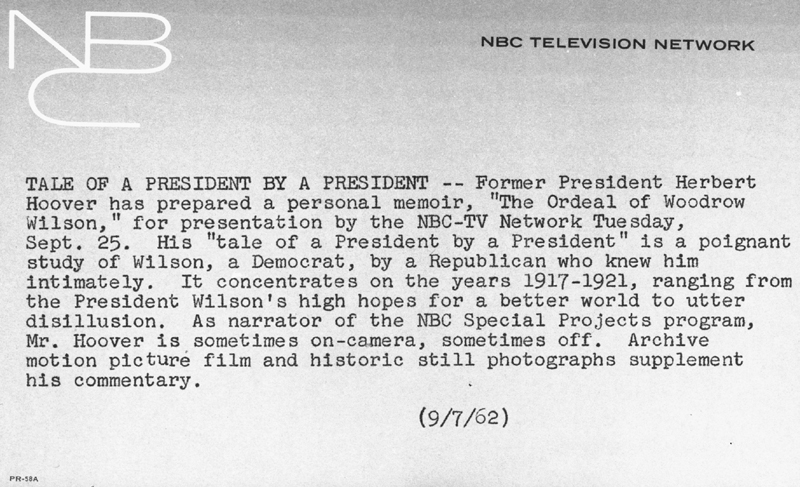
The Ordeal of a Biographer
Herbert Hoover Writes about Woodrow Wilson
Fall 2008, Vol. 40, No. 3
By Timothy Walch
Herbert Hoover, highly successful mining engineer, head of European recovery after World War I, secretary of commerce, and President of the United States, was also a prolific author.
In the course of his long and productive life, he produced thousands of pages in well over 40 books. These books ranged from highly technical volumes such as Principles of Mining and the arcane De Re Metallica to whimsical books such as On Growing Up and Fishing for Fun.
In between were volumes of political philosophy and criticism, several compilations of speeches, and seven thick books of memoirs—three that traced his life from his birth in West Branch to the end of the Great Depression and four more about his work as a famine relief administrator.
Hoover was even published posthumously. At the time of the centennial of his birth in 1974, the Government Printing Office issued four thick volumes of his public papers as President of the United States. It was quite a publishing record.
Of all his many books, however, there is one that stands out. The Ordeal of Woodrow Wilson is a special volume—indeed a unique volume—in publishing. For the first time in publishing history, and thus far the only time, a former President of the United States wrote a book about another former President. Just as important, it was a very good book that remains in print to this day in an edition that includes an introduction by Oregon's favorite Hoover scholar, former U.S. Senator Mark Hatfield.
The logical question for all of us to ask is why would a man who had just turned 80 years old take on the task of writing a biography of one of the most complicated Presidents of the 20th century? The simple answer is that Herbert Hoover thought of Woodrow Wilson as his political mentor. They were two men who shared a common political vision and who both faced political tragedy.
At first glance, there might appear to be little uniting the Princeton educator, the child of a prominent Virginia family who studied at some of the nation's most prestigious schools, and the practical businessman, an Iowa-born orphan who got by as an average student at the then-new and obscure Stanford University.
On closer examination, however, it is clear that the professor and the engineer were both progressives fiercely wedded to economic competition and determined to keep open the pathways of individual opportunity. Each was endowed with a powerful intellect; each was deficient in social graces. And neither man was temperamentally suited to the rough and tumble of presidential politics.
Herbert Hoover had a natural appreciation for Woodrow Wilson as a leader of lofty instincts and breathtaking vision. And after his unhappy White House term, Hoover had still more personal reasons for admiring a tragic hero like Wilson. Like his Democratic predecessor, Herbert Hoover enjoyed a meteoric rise to the summit of national leadership, only to see his reputation crash along with the American economy. Yet there was more to link the two idealists than public disillusionment.
"If you live long enough," Hoover liked to say, "the wheel turns, the pendulum swings." By the mid-1950s, as Americans prepared to mark the centennial of Woodrow Wilson's birth, Hoover himself had at last escaped the burden of the Great Depression.
Hoover had at least one critical advantage over Wilson—robust health. Wilson suffered from chronic hypertension and stomach disorders and may have had a number of minor strokes as early as 1896. A massive stroke in 1919 left him largely incapacitated. For Hoover, longevity indeed proved the best revenge. Not only did he outlive his enemies, he also would help to shape history's view of the turbulent century he had done so much to affect.
Hoover's desire to write of the past was still another bond with Wilson. In a curious coincidence, each man would write a favorable account of an American President. In 1893, as a Princeton professor, Wilson wrote a series of articles on George Washington for Harper's Magazine. When published in book form three years later, these essays earned the popular biographer a handsome income.
Hoover, by contrast, often wrote for accuracy, not color, with the result that he unintentionally bleached much of the life from his prose. The Ordeal of Woodrow Wilson is a notable exception. In these pages one revisits a critical time when hope, like sacrifice, was in full flower, only to be dashed by the conventions of power politics.
The book had an interesting genesis. According to Hoover, the project began as far back as 1939, when friends urged him to write a history of the "Great War," as World War I was called in those days. But Hoover demurred when he assessed the volume of documentation he would have to digest prior to writing such a book. He turned his attention elsewhere.
In the 1940s and early 1950s, the former President wrote books on public policy such as the Problems of Lasting Peace and later his three volumes of memoirs. He scribbled away for hours each day with the stubby pencils he favored over dictating machines.
In the first volume of his memoirs, published in 1948, Hoover wrote at some length about Wilson, whose unceasing purpose it had been from 1914 on to find some way to end the war and institutionalize the peace. Because Hoover had known Wilson personally, his writing had real verve and the power of truth.
Following the Wilson centennial in 1956, Hoover turned to Wilson as a primary subject of examination. He realized that of the dwindling band of Wilsonians still alive, he was uniquely qualified to tell the story of those distant events that broke Wilson's heart and denied the world a chance at collective peacemaking.
The first mention of a plan to write a biography of Wilson came in a letter to his friend and confidant, J. Reuben Clark. "I have about decided to quit making speeches," Hoover wrote in March of 1957, "and devote myself to writing a book about the 'Crucifixion of Woodrow Wilson at Versailles,' as a warning to somebody sometime." Clark embraced the idea of the book but delicately suggested that Hoover choose a different title—thus the crucifixion became the ordeal.
What was the story that Hoover wanted to tell? The book was not to be a typical biography of Wilson or history of events at Versailles. The former President wanted to write a memoir based upon the personal experience of one who had been at Wilson's side through a time of noble purpose and its shabby aftermath.
It was, of course, Hoover's stunning success as a famine relief administrator that first brought him to Wilson's attention. But his achievements in the early months of the war were ignored as Hoover focused his research and writing on Wilson at Versailles.
When the United States entered the war in April 1917, Hoover had provided the administrative spark sought by President Wilson in organizing a domestic food conservation effort of unprecedented scale. Americans were introduced to meatless Mondays and wheatless Wednesdays. All this achievement was ignored by Hoover.
A new word entered the language: to "Hooverize" meant to economize on food so that all might eat. Valentine's cards appeared in 1918 with the romantic message: "I can Hooverize on dinner. And on lights and fuel too. But I'll never learn to Hooverize when it comes to loving you." The word "Hooverize" does not appear in The Ordeal of Woodrow Wilson.
The book begins to tell of the President's ordeal in the months after the Armistice and the congressional elections. Drawing upon thousands of pages of documents as well as his own recollections, Hoover traced the sorrowful route from Wilson's initial rapturous European greeting to his subsequent defeat and physical collapse. Often labeled stubborn himself, Hoover took issue with critics of Wilson's alleged obstinacy.
The real problem at Versailles, Hoover insisted, was not Wilsonian idealism but Europe's prewar hatreds and resentments that were vastly increased by the horrors of the struggle. Both men tried and failed to breach an Allied blockade of food to prostrate postwar Germany, an act of savagery that set the stage for the rise of Adolf Hitler. Having stirred hope among the silent masses of humanity, Wilson suddenly found himself thrown into unfamiliar settings, among men impervious to his eloquence. Conflicts between European imperialism and American democracy arose that were essentially irreconcilable.
Hoover hoped to use his book to emphasize a point he made shortly after Wilson's death: "We are sadly in need of an idealism that transcends partisan politics," he wrote, "one rooted in principles beyond mere party allegiance, one capable of demonstrating the ancient American faith in the ability of one man or woman, fired with a noble purpose, to make a positive difference."
Because they shared that faith, Woodrow Wilson and Herbert Hoover were able to bridge whatever surface differences might otherwise have kept them apart. In doing so, these men drew upon deep reserves of individual character, national patriotism, and global humanitarianism.
Inspired by this noble cause, Hoover was determined to tell Wilson's story though his own eyes. He commissioned Walter Livingston, a trusted graduate student from New York University, to travel to Princeton and review the Wilson papers. Livingston was greatly aided in his work by Julian Boyd, who was then the university librarian, and Alexander Clark, the curator of manuscripts. Livingston also traveled to Yale to do research in the Edward House papers and prepared lengthy reports that Hoover used to prepare the book.
Although the task seems hardly possible for a man his age, Hoover had a manuscript ready for review by July. His files indicate that he sent a copy of several chapters to his close friend Perrin Galpin sometime in June and received a reply dated July 10. The response must have been gratifying to Hoover. "The book is magnificent," wrote Galpin. "I know it will be a fine and valuable contribution to the history of our times."
The former President worked on the manuscript throughout the summer and began hearing from publishers in August. While out west, he received offers from both Harold McGraw and Bennett Cerf, who wrote that their firms would be honored to publish such a historic volume. Hoover did not make a decision immediately; in fact, he bargained with both firms until mid-December, when he chose to place the book with McGraw-Hill.
The fall and winter of 1957 were devoted to getting the book ready for publication. In late October and early November, Hoover sent galleys by messenger to a number of friends.
Hoover's decision to wait on signing a publishing contract concerned Harold McGraw. In December he wrote to Hoover's agent, Neil MacNeill, that they were eager to move forward but needed Hoover's decision as soon as possible if the book was to be published in April. This prompted the former President to sign the contract.
What must have appealed to Hoover was the fact that McGraw-Hill had a large sales force that reached deep into the college and university market as well as into trade book stores. Just as important, the firm agreed to spend no less than 50 cents a copy on advertising. With a first run set at 20,000 copies, this meant an upfront investment of $10,000.
Hoover was considerably involved in the details of publication. He personally edited the jacket copy and commissioned others to place excerpts of the book in American Heritage and Parade magazine. In March and early April, he sent 200 copies to friends and associates who could influence the media. Among those receiving copies were Paul Harvey, John Cameron Swayze, Lowell Thomas, and even Ed Sullivan. Shortly thereafter a gall bladder attack sent him to the hospital.
The response to the book was very positive. As expected, the reviews were consistently excellent and appeared via the Associated Press in numerous newspapers. What must have cheered Hoover even more than the reviews, however, were the ads placed by McGraw-Hill in a broad range of major newspapers and magazines from the end of April through early June. The firm also promised a major effort by their sales force to reach every bookstore in their orbit. In all, McGraw-Hill sent out 500 review copies of the book, 800 specialty press releases, promotion cards to 1,500 libraries, and catalogs that reached 240,000 customers both here and abroad. Not surprisingly, the book quickly became a bestseller on both the New York Times and New York Herald Tribune lists.
During the summer and fall of 1958, Hoover received numerous letters from Americans both anonymous and prominent praising him for his work. What he had to say stirred many readers, not least of all Wilson's aged widow, Edith. "You seem to have really understood him," she wrote in gratitude. Wilson's daughter Eleanor Wilson McAdoo echoed her stepmother's approval, calling The Ordeal of Woodrow Wilson a fine and very moving appraisal.
Hoover also heard from men as different as the financier Bernard Baruch, the photographer Fabian Bachrach, the evangelist Bruce Barton, and FBI director J. Edgar Hoover. These men and many other readers loved the book and said as much to the former President.
One letter from a man named Carlyle E. Anderson seemed to best capture the public response to the book. "To me," wrote Anderson to Hoover, "you are one of the All Time, All Americans. If every Democrat read this book (and they all should) in all humility they would have to regard you too as a great All Time, All American. You are always so fair, so sound, so able and yet so humble. Long may you live."
Hoover must have loved the response, but there was more work to do to get the book into other hands. He pushed McGraw-Hill to place a major advertisement in the December 3 issue of the New York Times. The full page ad was titled "The nation acclaims a great book" and featured blurbs from publications all across the county. The ad also noted that this was a "superb bestseller" now in its fourth big printing. A coupon was included so that Times readers could order the book without delay! Hoover himself paid to run the same ad in other newspapers including the Chicago Tribune, the Philadelphia Inquirer, the Boston Herald, and the Washington Post. It would be, Hoover hoped, a thoughtful Christmas gift for 1958.
By the spring of 1959, the publicity campaign for the book was over. The Ordeal of Woodrow Wilson was one of Mr. Hoover's most successful books, and the most satisfying. McGraw-Hill had sold close to 30,000 copies, and Mr. Hoover's skills as a historian, biographer, and memoirist were heralded across the country. Not too shabby for a man who would soon celebrate his 85th birthday!
The popularity of the book led to a television program with the same title. Hoover's correspondence files indicate that the National Broadcasting Company filmed an interview with the former President on September 21 and 22, 1960. The program remained in production for two years but was finally broadcast on the evening of September 25, 1962. NBC estimated that close to 10 million people saw the program. In fact, the program did substantially better than the cowboy film being broadcast on the ABC network.
The Ordeal was not Hoover's final book, of course—far from it. In the last five years of his life, the former President published a four-volume history of his famine relief efforts titled An American Epic, a final volume of Addresses on the American Road, a delightful collection of letters to and from children called On Growing Up, and finally, his very popular book, Fishing for Fun, a title that remains in print to this day.
If Herbert Hoover was not a great biographer, he was an honest one. He used his memories of Woodrow Wilson to educate readers about the burdens of presidential leadership. He knew that burden; he had been there. Most important to Hoover, however, was that he set the record straight on his mentor. Our understanding of both the 28th and the 31st Presidents of the United States is better for his effort.
Timothy Walch is director of the Herbert Hoover Library in West Branch, Iowa. A former editor of Prologue, he is the author of many books, including Uncommon Americans: The Lives and Legacies of Herbert and Lou Henry Hoover (2003).




